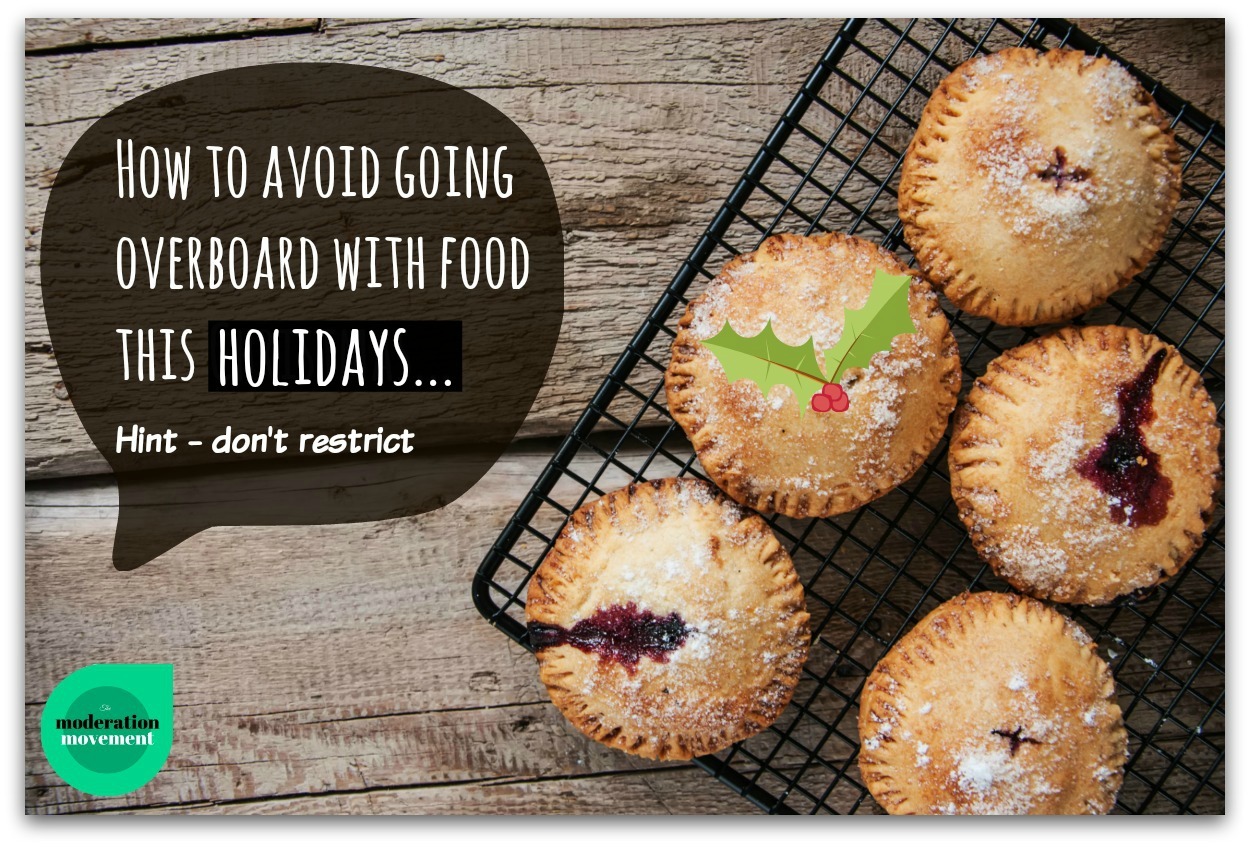How to avoid going overboard with food this holidays… Hint – don’t restrict!

As a dietitian, at this time of year, a common question from clients is how to go about managing the extra food around the Christmas/New Year period.
With Christmas, New Year and summer holidays fast approaching, many of us find ourselves at more social gatherings with an abundance of food and alcohol. You might also find yourself doing more cooking or baking. While this shouldn’t be a problem in terms of nutrition, health or eating intuitively, diet culture makes it seem like a problem.
What do I mean by diet culture? Diet culture is the idea that certain foods are bad for you or fattening, that to keep your weight in check (or to lose weight) you must eat less, or at least not too much. The thought that if you do “indulge”, you need to restrict or be careful the next day or do more exercise, is also part of diet culture.
The problem with this type of thinking is that it pretty much always leads to over-eating the very food you think you shouldn’t be having too much off. You restrict until you’re faced with the food, at a party, at a friends house, at the office and you find yourself thinking “stuff it, one won’t hurt…”. Because you’ve been restricting the food, the food not only looks more appealing, but the pleasure centre in your brain goes nuts over the taste and you find yourself wanting to keep eating. This is part of the “I’ll get it while I can” or “last supper” effect, where you think you may as well eat as much as you can now and then you’ll “be good” tomorrow. Sound familiar?
For many people, this drive to keep eating reaffirms the belief you can’t be trusted around certain food, or that you are “addicted” to sugar*. However, it may actually be the restriction that it the issue, from a physiological and psychological standpoint.
If you’re someone who tends to restrict how much you eat after you’ve eaten too much, there’s a very good chance you’re messing with your appetite regulation. Not eating enough during the day and then getting to the point of being too hungry is a sure way to increase your risk of over-eating at some point, usually in the afternoon or evening. If the food available happens to be food you’re trying hard to limit, you’ll most likely find it next to impossible to not overeat that food. When you do overeat, you then feel terrible about yourself, that you’ve “failed” or been “bad” – this is part of the psychological trauma of diet culture.
What if there were no restrictions on any food? No diet culture telling you sugar is evil or that you shouldn’t eat that if you want to lose weight? What if at the time of eating you could calmly assess your appetite and desire for the food and then enjoy eating the food to the point of satisfaction? This is what intuitive eating is all about.
Eating to satisfaction involves the pleasure of the food itself and feeling comfortable in your body afterwards. Your decision about how much to eat is influenced by having acknowledged satisfaction and not wanting to feel uncomfortably full or sickly. When you know you can enjoy the food in question whenever you feel like it, having less in the moment is an easier thing to do.
This may sound like an impossibility to some of you, but what is required is letting go of, or loosening your grip on, food restriction and on diet culture. If you’re not dieting or restricting food, you’re less likely end up over-hungry and vulnerable to over-eating and while the pleasure centre in your brain will still be activated by food (as it’s designed to), it won’t go as nuts. This, combined with attunement to satisfaction and the knowledge you can have more of the yummy food later, is what will allow you to feel calm around food during periods such as Christmas.
Another aspect that must be acknowledged in all of this, is how you feel about your body. Diet culture thrives on you feeling bad about your body and ultimately how you feel about your body underpins the need you feel to diet or restrict food. You can’t effectively address your problems with food until you start addressing how you feel about your body. For most people, the body stuff is toughest work and you may need help from a skilled non-diet dietitian or therapist who works within the Health At Every Size paradigm. Let us know if you need help finding one.
